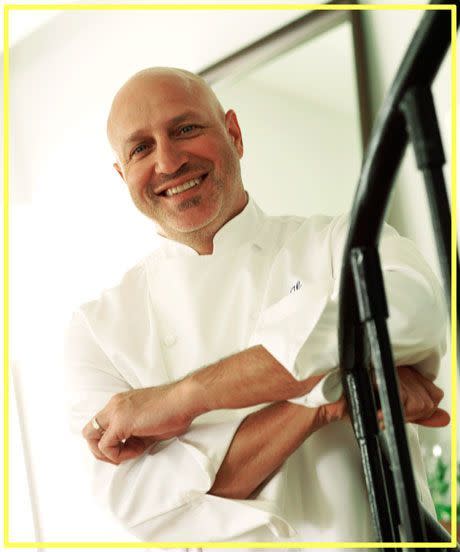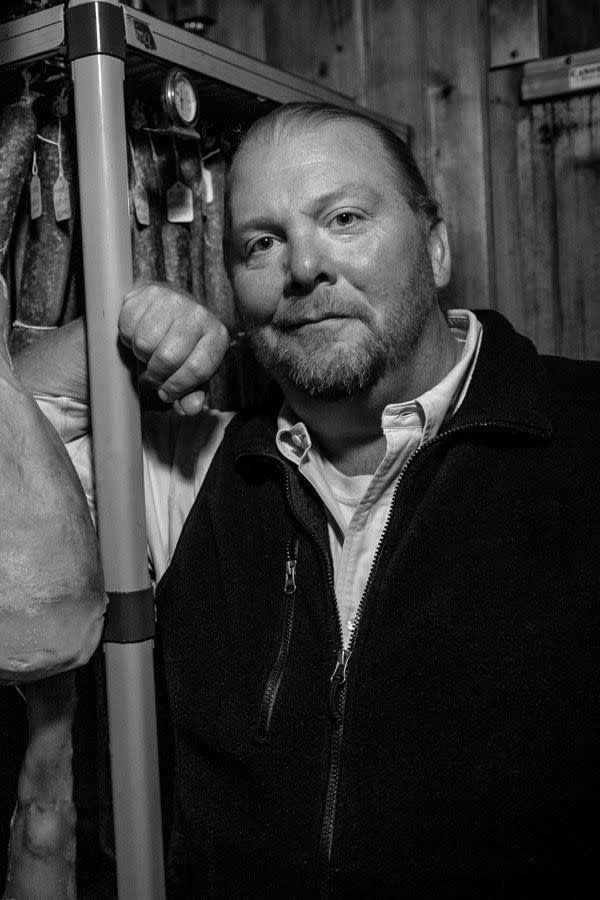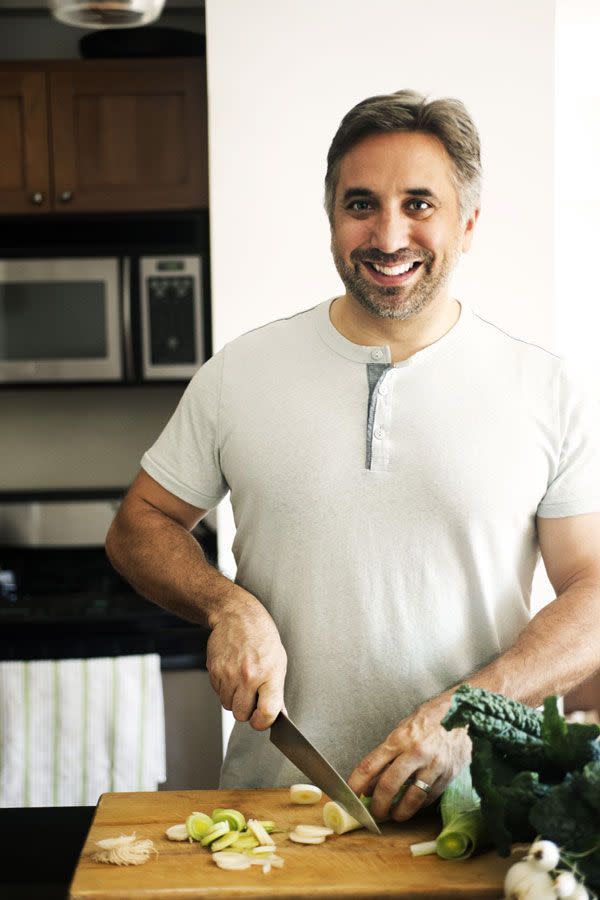How 9 Visionaries Would Change Our Food System If They Could

Earlier this year, I watched Josh Tetrick of Hampton Creek give a short speech at the Bite Food Conference in California. He asked a question that was so simple, it blew me away: “What would (the food system) look like if we started over?” As we all know, the food system is a mess. Everyone and no one seems to have an answer of how we can solve it all.
Related: 30 Photos Of Unretouched Butts, In Case You Forgot What They Really Look Like
So, I decided to ask some of my food heroes (chefs, writers, entrepreneurs, and food activists), a version of J.T.’s question: “How would you change the food system if we could just start over? Abandon logic and reason, and just imagine you had a reset button. What would you do?”
Related: 25 Real Photos Of Women’s Breasts (NSFW)
Scroll through to find some seriously interesting, inspiring — and unexpected! — answers from people like Mario Batali, Dan Barber, Tom Colicchio, Jamie Oliver, and many more.

Chef Dan Barber, Blue Hill Farm
“If a genie actually granted me one wish, I’d go small — or so it would seem. I’d have a law passed that made it illegal to apply nitrogen to wheat late in the growing season. Banning this late nitrogen application would prevent a tremendous amount of runoff from polluting our waterways and our oceans. It would also lead to wheat with lower protein levels. (Nitrogen boosts protein quickly, and packaged breads — the Wonder Breads of the world — demand high-protein wheat.) Without artificially inflated protein levels, the industry would not have the strong wheat they need to withstand the battering of industrial high-speed mixers. Packaged bread would become much more expensive. More expensive packaged bread would mean that the loaves that actually taste good — made with nothing except good wheat, water, and salt — would become a relative bargain.
Related: What Losing 110 Pounds REALLY Looks Like
"As people discovered the taste of wheat, they would demand it from local farmers. Wheat grown locally would lead to more local milling and malting facilities, invigorating an economy around supporting good bread. In the end, my small wish would result in improving the soil health of the 55 million acres of wheat grown in this country and vastly improving the flavor of our most essential staple grain." (Photo: Mark Ostow)

Chef Mario Batali, Babbo
"We need to go back to whenever it was that food changed from being a basic human right to a commodity. We need to go back and put ‘food for all’ ahead of commercial interests. Appalling hunger, along with outrageous levels of waste and environmental destruction, is a byproduct of our current food system — and it’s obviously broken.
"Today, fewer and fewer farmers are controlling more and more of the production and the labor, and yet 70% of the world’s hungry are actually directly involved in food production. And here in America, cheap, calorie-dense processed “foods” — that I don’t think you can even call food — are often the only financially logical choices for far too many households.
Related: The True Story Of Eyebrow Transplants
"We tend to simplify the problem by saying we just need to offer access to healthier fruits and vegetables, but that is not sufficient, and that doesn’t change the fact that everyone has the right to sustenance. This approach to food as a commodity and lack of regard for the less fortunate among us can be linked to many of the ills in our food system, from Concentrated Animal Feeding Operations (CAFOs), antibiotics in our meat, GMOs, farm laborer abuses, and on the opposite end, obesity and climate change.” (Photo: Mario Batali)

Chef Jamie Oliver, Author Of Everyday Super Food
“I’d hit the reset button on something I am focusing on right now, which is getting the British government to introduce a tax on fizzy soft drinks with added sugar. Crucially, the money raised from this tax would be put to immediate use, supporting initiatives to prevent obesity and diet-related diseases in our hospitals and schools, and, of course, in funding better food education. Earlier this year, I visited Mexico and saw the great work that’s being done as a result of their sugar tax and it’s very inspiring — it proves that taxes like this can work.
Related: This 30-Day Upper-Body Challenge Will Transform Your Arms & Shoulders
"We have a global obesity crisis. We can’t shy away from that and we desperately and urgently need to take action in order to save lives and turn this crisis around. We have a chance to try and prevent the next generation living shorter lives than us, and we need to tackle this now. In the U.K., we spend billions every year on treating diet-related disease — it’s crippling our health system. We also have 26,000 kids of elementary school age having multiple teeth removed under anaesthetic every year, all because of too much sugar.
"The majority of better food education leads to better food choices. I’ve seen this in schools and homes all over the world. We all love a treat sometimes, and I’m not arguing with that, but when a treat becomes an everyday occurrence, that’s when the problems start. We’re seeing this with sugary drinks — taxing them is a great place to start, because it not only raises awareness of their negative impact, it will raise all-important funds for food education, too.” (Photo: Jamie Oliver, Ltd.)

Marion Nestle, Professor Of Nutrition & Food Studies at N.Y.U.
“I’d say let’s fix the farm bill. I want agricultural policy aligned with health policy, so every decision about agricultural policy takes human and environmental health into consideration. Right now, the farm bill supports commodity agriculture and does virtually nothing to promote consumption of fruits and vegetables. That’s fixable! If we made this change, we would all eat more healthfully, and our agricultural system would be more sustainable and have less of an effect on climate change.” (Photo: Bill Hayes)

Leanne Brown, Author Of Good and Cheap: Eat Well on $4/Day
“To build an equitable, just food system, we need to make a great many changes, not just one. But if there’s one change that has the potential to improve nearly every aspect of the food system, it’s teaching kids how to cook.
"I would make cooking a mandatory part of school curriculum: showing first-graders a dozen ways to cook a carrot, asking middle-schoolers what makes Italian food Italian, and ensuring high school seniors know how to prepare delicious, reasonably healthy meals that fit even the smallest budget and make ‘starving student’ an oxymoron.
Related: The Secret To The Perfect Plank
"Kids could be responsible for making lunch for themselves and their classmates once per week and asked as homework to make dinner for their family occasionally, starting at an appropriate age. Food-educated kids will grow into adults who are better able to navigate the complex food environment. They can demand better choices and reject the food myths we are currently fed (like that healthy food is expensive, or that making delicious food is difficult).
"If people value and understand food, they will support policies that respect farmers and encourage sustainable farming practices. If people value and understand food, they will be more willing to support the rights of workers in every part of the system and pay them living wages. If people value and understand food, they will realize that we have the ability to make real food a basic right for every single person.” (Photo: Jordan Matter)

Chef Tom Colicchio, Crafted Hospitality Group
“I really think that the agricultural government subsidy program is a big problem. If I had a reset button, I’d get rid of all agricultural subsidies. Currently, the U.S. government heavily subsidizes crops like wheat, corn, and soy, and it has a major impact on pricing of foods. Why is someone eating a fast food burger, for example? Because it’s cheap. And it’s cheap because it’s subsidized. Getting rid of subsidies would allow farmers compete on an open playing field. I’ve met with many farmers who are not subsidized by the government and they don’t want a hand out, they just want to be able to compete.
Related: 4 Crazy Makeup Hacks You Need To Learn Now
"Many people argue that ending these kinds of subsidies would have negative consequences on farms, farmers, and food production, but that has not been the case in New Zealand, which did away with its crop insurance policies years ago. The result of this change? A peach, for example, would be competitively priced with a fast food hamburger; that would have a major impact on people’s purchasing decisions, our resulting food system, as well as their health.”

Chef Marco Canora, Hearth
“I’d press a reset button on transparency in the restaurant industry, because there needs to be a huge shift. As people become (rightfully) concerned with what they and their families can and cannot eat, restaurants must be more stringent and utilize a third party to enforce guidelines that eliminate the uncertainty surrounding what they serve their customers.
Related: All The Boob Questions You Were Afraid To Ask, ANSWERED
"For example, a restaurant can say that it’s serving 100% grass-fed beef, when in reality, the fact may be very different, and there is no way to prove or challenge this claim. This is at the core of what must be changed in our world, in order to ensure that restaurants are indeed serving what they claim to serve.” (Photo: Michael Harlan Turkell)
By Elettra Wiedemann

